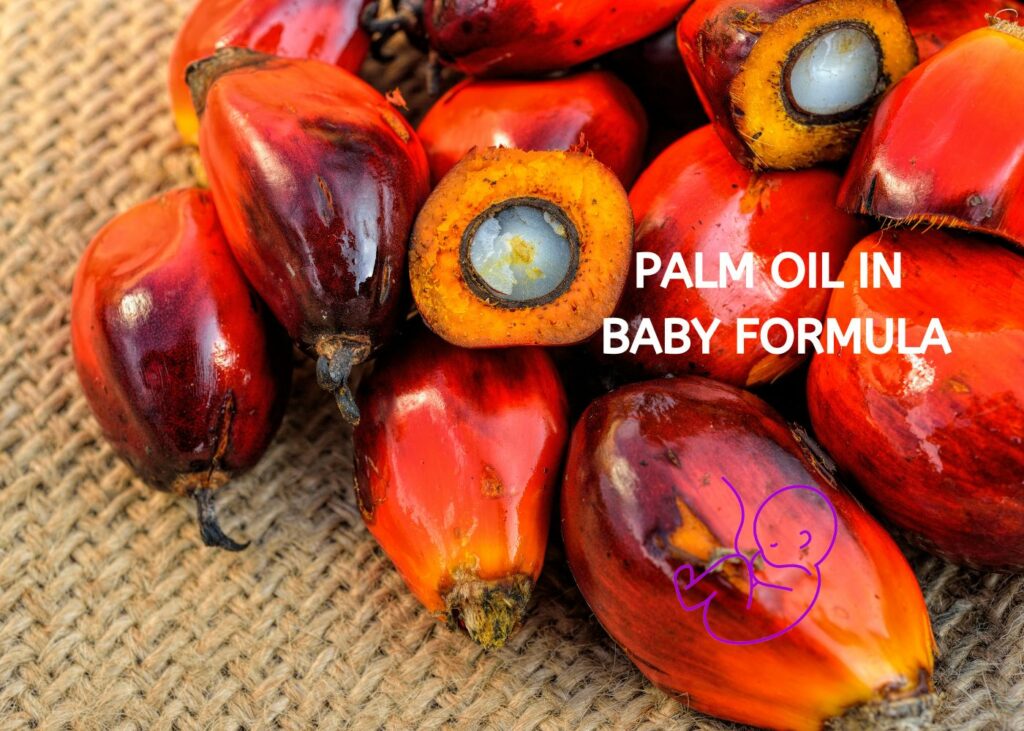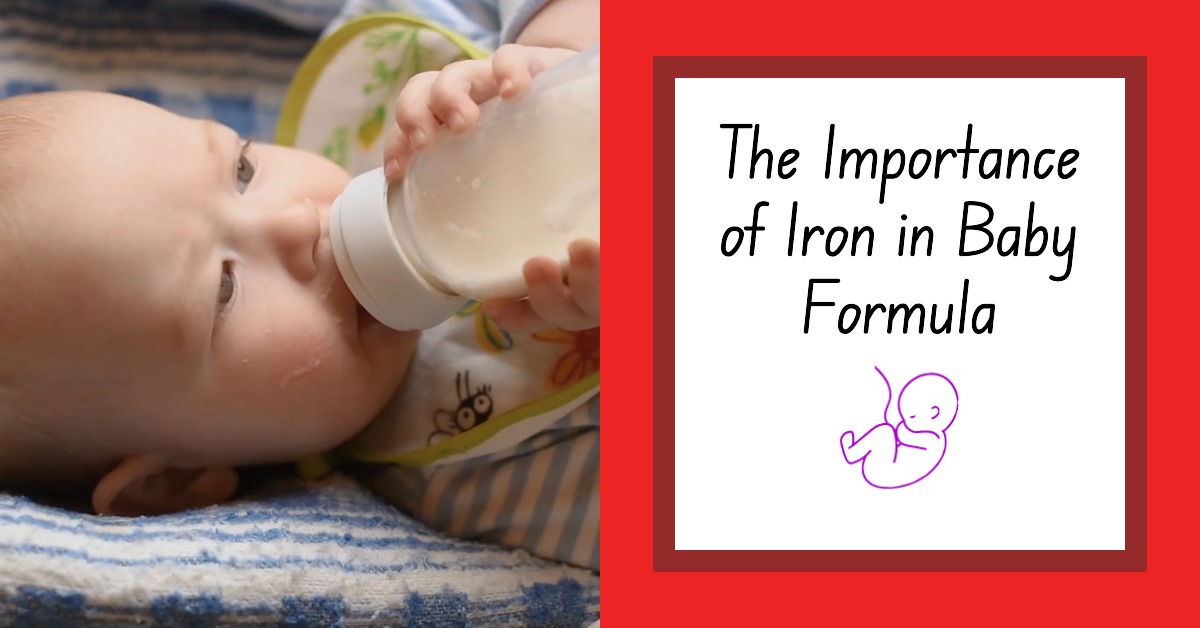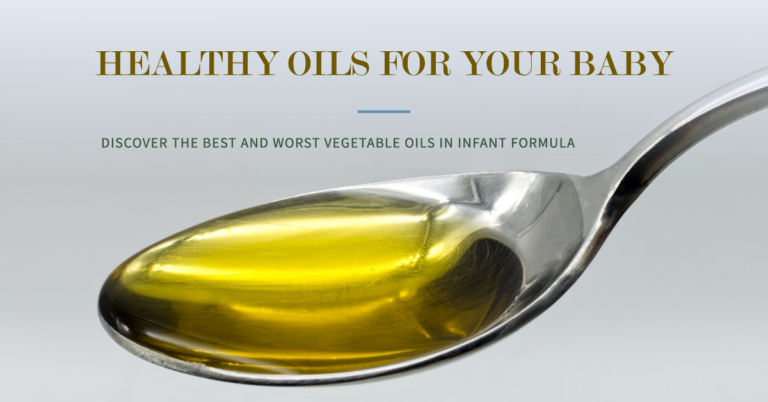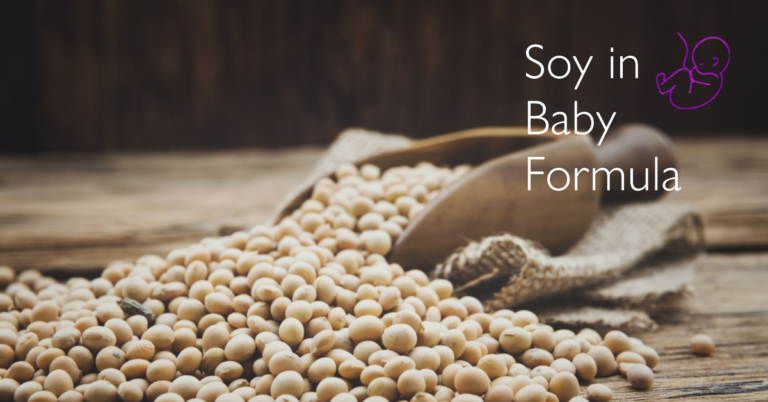
Key Takeaways
Question Key Takeaways What is Palm Oil? Palm oil is a cost-effective and versatile ingredient rich in fatty acids and vitamin E. It is derived from the fruit of the oil palm tree and is widely used in baby formula. However, it’s also linked to deforestation and has a high saturated fat content. Why is Palm Oil Used in Baby Formula? Palm oil is used in baby formula because of its nutritional similarity to breast milk and its emulsifying properties. It provides essential fatty acids, but may reduce nutrient absorption and cause digestive issues. Is Palm Oil Safe for Babies? Palm oil, rich in palmitic acid, is generally safe for babies when consumed appropriately. However, there are differences in the types of palmitic acid used in formula and those found in breast milk, which may affect nutrient absorption and digestive health. ✅ Benefits of Palm Oil in Baby Formula Palm oil provides essential saturated fats crucial for brain development and immune support. It contains lauric acid, which protects infants from harmful bacteria and viruses, and is rich in vitamin E. It’s also cost-effective for manufacturers. ⚠️ Dangers of Palm Oil in Baby Formula Palm oil in baby formula might reduce the absorption of certain nutrients and affect bone strength, weight gain, and stool consistency. Its production also has significant environmental and ethical concerns. The long-term effects are still under research. Alternatives to Palm Oil Algae oil, coconut oil, soybean oil, sunflower seed oil, and rapeseed (Canola) oil are potential substitutes for palm oil in baby formulas. Each of these oils have their own nutritional benefits and potential controversies.
In this post, we will analyze the properties of palm oil in baby formula: its benefits, dangers and nutritional information so that as a parent, you can make an informed decision about your baby’s formula.
Let’s get after it!
Related read: Seed Oils in Baby Formula
Our Short Opinion and Experience
We recommend you read the entire article before deciding whether to buy a palm oil-free formula, but here is our personal input:
Although palm oil has benefits that have been studied, we honestly believe its potential dangers do not compensate enough.
Does that mean that formulas with palm oil are bad?
Not at all. But given a choice between two formulas of similar qualities, we will choose the one without palm oil.
This ingredient is another factor among many when choosing baby formula or any other food for our baby.
In our case, we always prioritize that the ingredients are as natural as possible, without chemicals, and organic if possible.
Once this requirement is met, the rest is secondary and not as important.
What Is Palm Oil?
Palm oil is a type of vegetable oil that is derived from the fruit of the oil palm tree. This type of oil is widely used in a variety of foods, including baby formula. Palm oil has become an attractive ingredient for food manufacturers due to its low cost and versatility.
Palm oil is widely used in baby formula due to its low cost and versatility.
It is rich in fatty acids and vitamin E, beneficial for health, but its production is linked to deforestation and high saturated fat content.
Palm oil has a neutral flavor and can be mixed with other oils to create different fats.
It is rich in fatty acids and vitamin E, which are beneficial for energy, skin, and eye health.
However, there are concerns about its environmental impact, as its production is linked to deforestation and habitat destruction.
Health experts caution against consuming too much-saturated fat, and palm oil has a high saturated fat content compared to other vegetable oils. Having said that, babies do need higher amounts of saturated fats for brain and tissue development.
Why is Palm Oil used in baby formula?
According to the World Wildlife Fund (WWF), approximately 50% of all packaged products found in supermarkets contain palm oil. But why is palm oil used in baby formula?
Palm oil is commonly used in baby formula due to its nutritional similarity to breast milk and emulsifying properties. It provides essential fatty acids but may reduce nutrient absorption and cause digestive issues. The safety and optimal composition are still being studied.
Palm oil is a common ingredient in baby formula due to its nutritional profile similar to human breast milk and its role in nutrient absorption. It provides essential fatty acids and aids in absorbing fat-soluble vitamins.
Palm oil’s emulsifying properties keep the formula consistent, avoiding separation or clumping for better quality and convenience.
Additionally, palm oil is a more affordable choice for manufacturers than other plant oils like coconut or soybean.
However, its usage isn’t without controversy. Some research suggests palm oil might reduce the absorption of certain nutrients, impact bone mineralization, and cause digestive issues like harder stools and constipation in infants.
It’s worth noting that the full implications of palm oil in baby formula are still being studied for more conclusive insights.
Is It Safe For Babies?
Palm oil, rich in palmitic acid, is generally safe for babies when consumed appropriately.
This saturated fat found abundantly in the human body, is vital for energy, nervous system function, lung function, and cell adhesion.
Palm oil is often added to infant formula to mimic the nutritional profile of breast milk, which also contains palmitic acid.
Two forms of palmitic acid exist: alpha and beta. Infant formula mainly uses the alpha form, but the beta form – predominant in breast milk – enhances fat and calcium absorption, and benefits intestinal microflora.
Recent scientific understanding motivates efforts to increase beta and reduce alpha forms in formula, though this remains challenging.
Strict regulations govern the composition of infant foods, including formula milk, based on scientific evidence. Some oils, like sesame and cottonseed, are banned due to health risks, but not palm oil.
Despite no legal obligation, some formula milk manufacturers highlight a higher percentage of beta-palmitic acid on labels as a positive attribute.
What are the benefits of palm oil in baby formula?
Palm oil provides essential saturated fats for infants’ brain development and immune support.
It contains lauric acid, supports a healthy immune system, provides vital calories without digestive upset, and is rich in vitamin E.
It is also cost-effective for manufacturers.
It’s a source of essential saturated fats for infants’ brain development and immune system support.
Palm oil contains lauric acid, an antimicrobial compound that protects infants from harmful bacteria and viruses. This acid is also present in breast milk and supports a healthy immune system.
It contributes vital calories needed for the high-energy demand of growing infants without causing digestive upset or adverse side effects.
Palm oil is rich in vitamin E, an important antioxidant that aids overall health. It protects cells from oxidative stress and potential damage from free radicals, supports healthy skin, and may help prevent eye damage.
Economically, palm oil is a cost-effective ingredient. It’s cheaper than other oils like soybean or sunflower, making it a preferred choice for manufacturers.
What Are The Dangers Of Palm Oil In Baby Formula?
Studies suggest that palm oil in baby formula may affect nutrient absorption, bone strength, weight gain, and stool consistency.
Effects on gut health, tummy troubles, and long-term health are still being researched.
The fats in palm oil and those in human milk are arranged differently.
In human milk, a fat called palmitic acid is set up in a way that is easy for babies to absorb. However, this same fat is placed differently in palm oil, making it harder for babies to absorb.
Studies suggest that when babies drink formula with palm oil, they may not absorb certain nutrients as well, like fats, DHA (an important omega-3 fatty acid), palmitate (another kind of fat), and calcium.
This could affect their bone strength, and their stools might be softer.
They may also not gain weight as quickly as drinking formulas without palm oil.
Some studies also suggest that formulas with palm oil could lead to harder stools, but there’s no solid proof yet on this or on its effects on babies’ tummy troubles, their gut health, and how their body handles fats.
Some formula makers have tried rearranging the fats in palm oil to make it more like human milk. But this doesn’t change the possible effects of palm oil in baby formula.
However, it’s important to know that research is ongoing, and different studies have different results.
Some suggest the effects on bone health might not last long, and the growth of babies might not be affected.
Also, we don’t yet have studies on how palm oil in baby formulas might affect long-term health.
Sources:
- https://journals.lww.com
- https://pubmed.ncbi.nlm.nih.gov/33260586/
- https://pubmed.ncbi.nlm.nih.gov/31022096/
Palm Oil in Formula: Pros and Cons Table
Disclaimer: there is not enough evidence and studies to be 100% sure of the dangers or benefits of palm oil. The table below represents the general knowledge we have nowadays of the pros and cons of palm oil in baby formula.
| Pros | Cons |
|---|---|
| Provides essential saturated fats for babies crucial for brain development | ⚠️ Might reduce the absorption of important nutrients like fats, DHA, palmitate, and calcium |
| Rich in palmitic acid, but not the same one as in breast milk | May lead to harder stools or constipation |
| ❤️ May have beneficial effects on heart health, including lowering LDL (bad) cholesterol and increasing HDL (good) cholesterol | Production of palm oil has a significant environmental impact, contributing to deforestation and climate change |
| Red palm oil is rich in carotenoids that the body can convert into vitamin A, essential for immune function and vision | Ethical concerns exist around the palm oil industry, including low wages and unsafe working conditions |
| Economically beneficial for manufacturers due to lower cost | Potential allergies or sensitivities to palm oil could cause digestive issues or other reactions |
| Rich in vitamin E, an antioxidant that supports overall health, healthy skin, and may prevent eye damage | Can cause slower weight gain compared to formulas without palm oil |
| Contains lauric acid, an antimicrobial compound protecting infants from harmful bacteria and viruses | Full implications of palm oil in baby formula still need further study |
What are the alternatives to palm oil?
There exist various alternatives to palm oil that can be utilized in baby formula. Even though some of these alternatives have controversies of their own, they’re worth considering as potential substitutes for palm oil.
Algae Oil
Algae oil is an excellent alternative to palm oil. It is notably rich in DHA and EPA, two important omega-3 fatty acids that play an integral role in infant brain development.
Unlike numerous vegetable oils, algae oil doesn’t contain any trans fats or saturated fats, contributing to its health benefits. In addition, it boasts a neutral taste and odor, ensuring it doesn’t interfere with the flavor of the formula.
Coconut Oil
Another viable alternative to palm oil is coconut oil. This oil contains medium-chain triglycerides (MCTs) which assist in enhancing digestion and nutrient absorption.
Notably, coconut oil is rich in lauric acid, a type of fatty acid with antimicrobial properties. This can aid in the prevention of infections in infants.
Soybean Oil
Soybean oil serves as another potential substitute for palm oil in baby formula. It contains linoleic acid, an omega-6 fatty acid promoting healthy skin and hair growth.
Furthermore, it provides alpha-linolenic acid (ALA), an omega-3 fatty acid known for its ability to reduce inflammation and enhance cognitive function. However, some infants may experience allergies and digestive issues with soybean oil, warranting caution.
Sunflower Seed Oil
Sunflower seed oil is another considerable alternative to palm oil for use in baby formula. This oil contains polyunsaturated fats (PUFAs), which assist in maintaining healthy cholesterol levels and potentially reducing the risk of heart disease later in life.
Moreover, sunflower seed oil is a source of Vitamin E, a powerful antioxidant that protects cells from free radical damage.
Rapeseed (Canola) Oil
Rapeseed, also known as Canola, oil may serve as another substitute for palm oil-based formulas. This oil is particularly rich in monounsaturated fats, which are essential for heart health, and is low in saturated fats.
Conclusion
If you have reached the end, thank you very much for reading the whole article about palm oil in baby formula.
We hope it has helped you to be better informed and to decide whether or not to buy a formula with this ingredient.
Remember to read labels and nutritional information, talk to a pediatrician and consider your baby’s needs.
As always, you are welcome to share your experiences and doubts in the comments section.
See you soon!
We’re Maria and Alberto, a married couple and educators who are nutrition enthusiasts. Even before we had kids, we were already crazy about nutrition.
We’d read scientific articles, watch videos from nutritionists, and spend hours listening to nutrition podcasts.
Today, we continue doing this, but in a different way, as we’ve learned to sift through the noise and trends. Nutrition, like any other field of knowledge, the more you read and learn, the more you develop a comprehensive understanding of reality, and that’s what has happened to us.
Before having our first child, we focused on learning everything we could about child nutrition, using the same techniques we had already employed, backed by our extensive knowledge in nutrition.
Our mission is to help other parents with their children’s nutrition, to help them become the best versions of themselves.
If we are what we eat and drink, which is absolutely true, let’s do it right!







